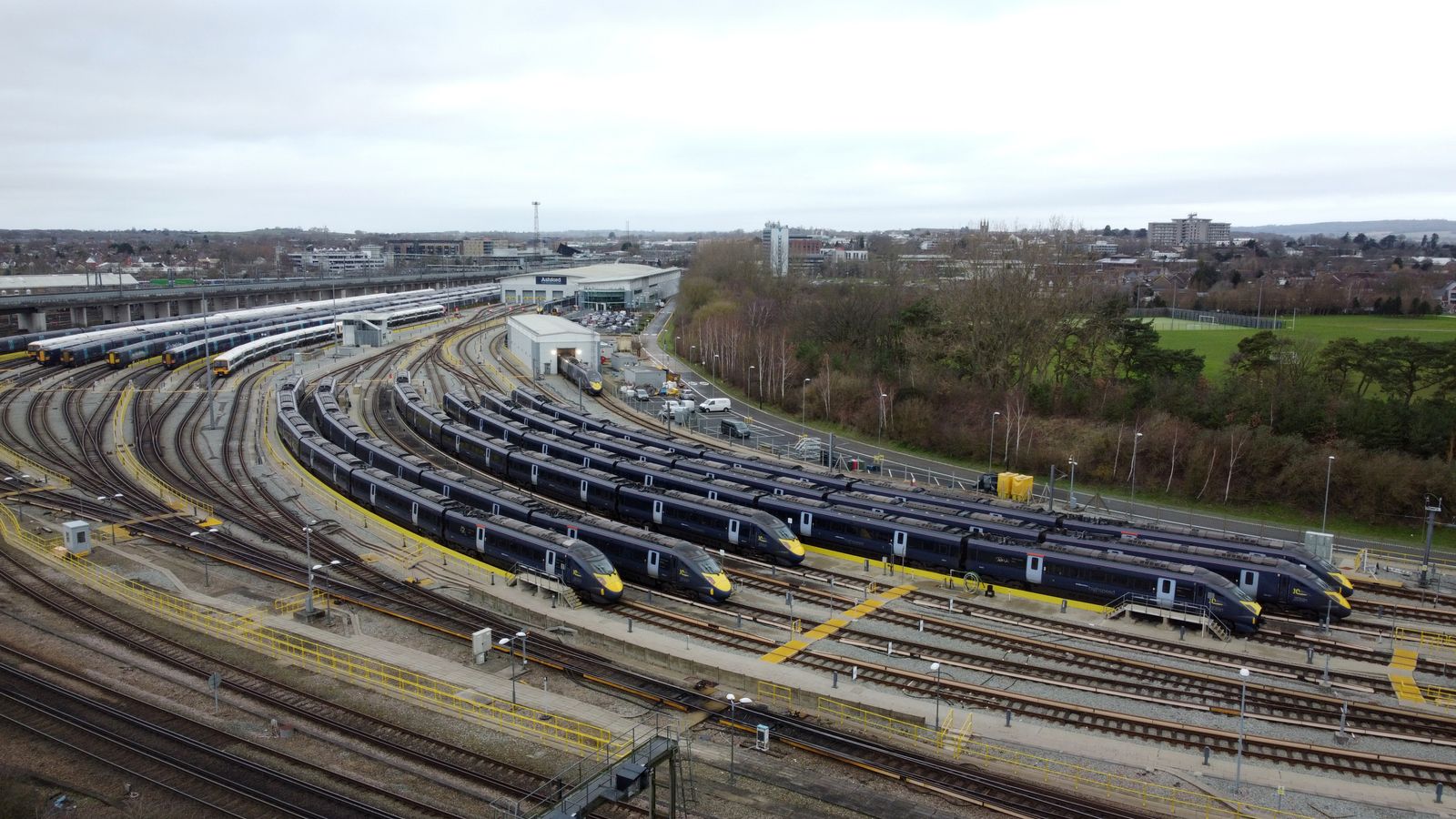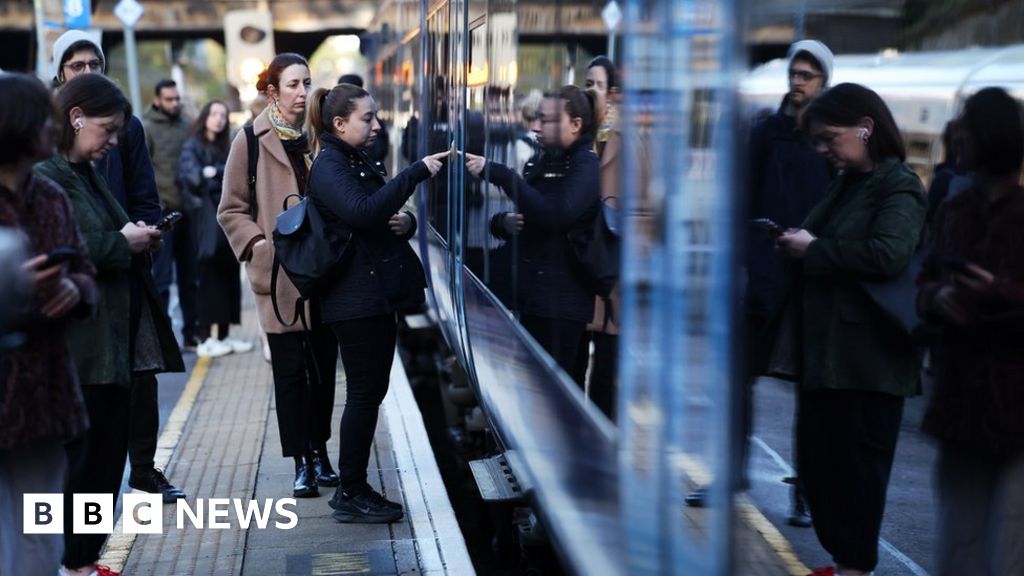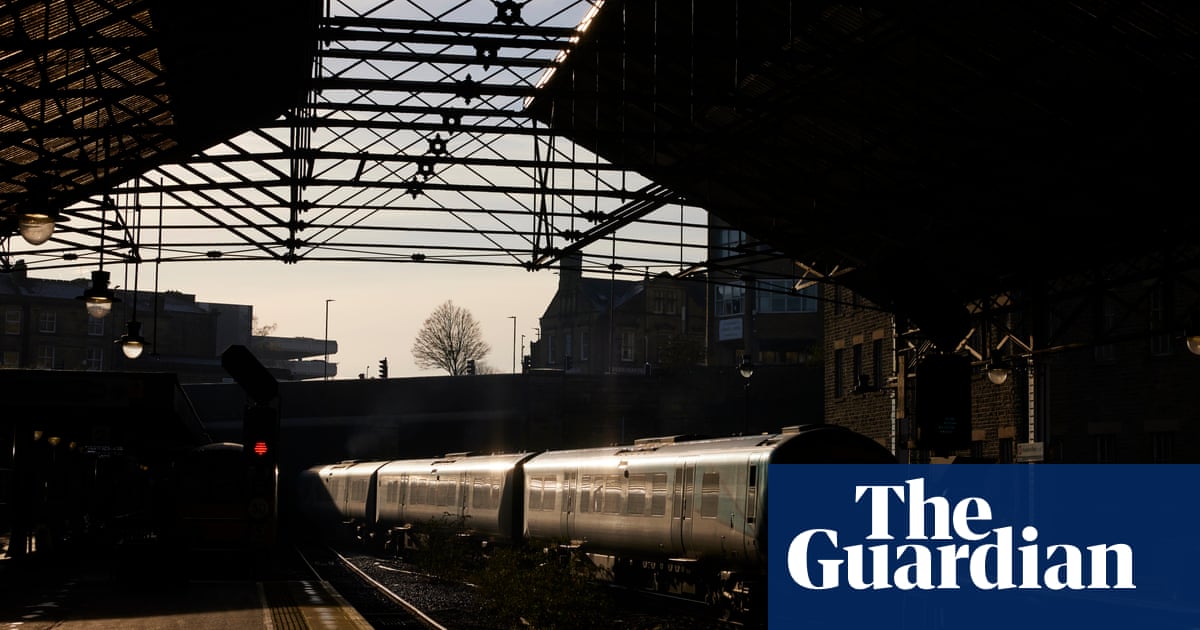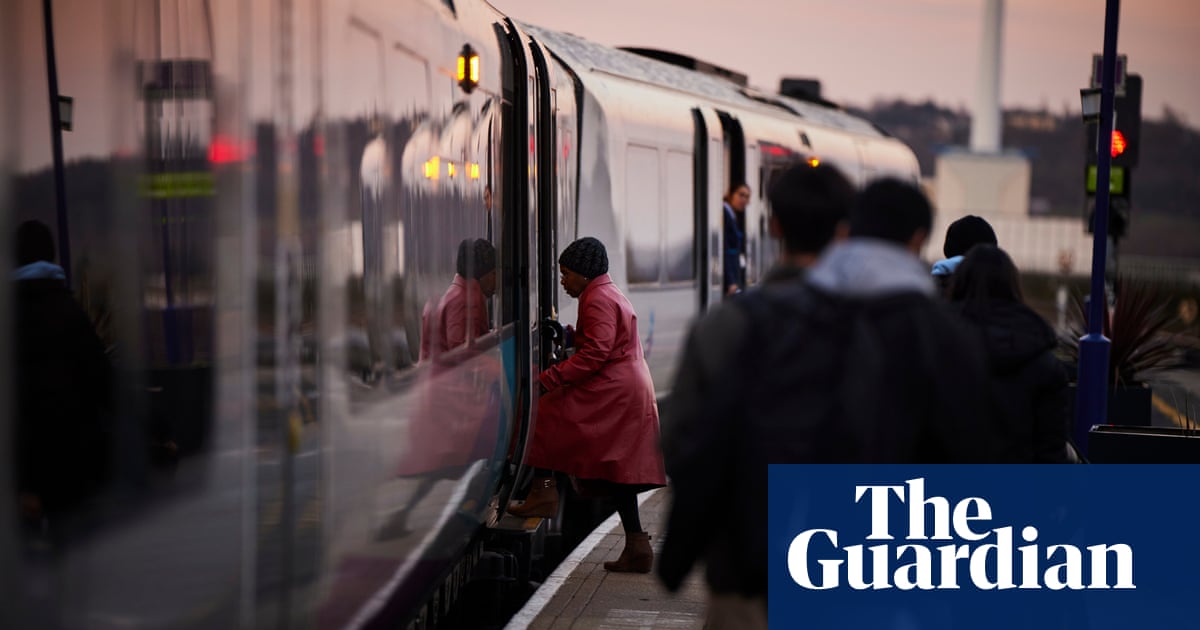
Labour announces plans to establish the long-delayed Great British Railways (GBR) organization, promising public ownership of routes and a 'best-price ticket guarantee' for travelers. The Conservatives criticize the lack of a funding plan. GBR aims to simplify the franchise system and boost passenger numbers. Labour vows to launch GBR if they win the next election, emphasizing an end to network fragmentation and bureaucracy.

Great British Railways (GBR) is a proposed state-owned public body that is to oversee rail transport in Great Britain except for Transport for London, Merseytravel, light rail and tram services. It is to assume most rail functions of the Department for Transport (DfT) and the Rail Delivery Group, including procuring services and setting fares. In addition, it is to absorb Network Rail to become the operator of most rail infrastructure across Great Britain. It will not affect the existing powers of the UK's devolved administrations in their areas. The concession contract system is to be the long-term replacement for the previous system of passenger rail franchising run by the DfT, which became unsustainable early in 2020 during the COVID-19 pandemic. GBR will be modelled on the operations of Transport for London, which contracts services on systems such as London Overground. GBR is to be based in Derby.The 2023 King's speech announced the progression of a draft Rail Reform Bill which would enable the establishment of GBR, although it has not been timetabled in the Parliamentary programme.

British Railways (BR), which from 1965 traded as British Rail, was a state-owned company that operated most rail transport in Great Britain from 1948 to 1997. Originally a trading brand of the Railway Executive of the British Transport Commission, it became an independent statutory corporation in January 1963, when it was formally renamed the British Railways Board.British Railways was formed on 1 January 1948 as a result of the Transport Act 1947, which nationalised the Big Four British railway companies along with some other (but not all) smaller railways. Profitability of the railways became a pressing concern during the 1950s, leading to multiple efforts to bolster performance, including some line closures. The 1955 Modernisation Plan formally directed a process of dieselisation and electrification to take place; accordingly, steam locomotives had been entirely replaced by diesel and electric traction (except for the narrow-gauge Vale of Rheidol Railway tourist line) by 1968. On 1 January 1963, the British Railways Board was created to manage the railways as a successor to the British Transport Commission.It was during the 1960s that perhaps the most substantial changes were made. Seeking to reduce rail subsidies, one-third of the network and over half of all stations were permanently closed under the Beeching cuts. Trunk routes were considered to be the most important, and so electrification of the Great Eastern Main Line from London to Norwich was completed between 1976 and 1986 and on the East Coast Main Line from London to Edinburgh between 1985 and 1990. Train manufacturer British Rail Engineering Limited (BREL) produced the capable InterCity 125 and Sprinter sets, the introduction of which improved intercity and regional railways respectively, as well as the unsuccessful Advanced Passenger Train (APT). Gradually, passengers replaced freight as the main source of business. From 1982, under sectorisation, the regions were gradually replaced by "business sectors", which were originally responsible for marketing and other commercial matters when they were first created but had taken over entirely by 1990.During the 1980s and 1990s, the British Government directed the privatisation of British Rail. Following completion of the privatisation process in 1997, responsibility for track, signalling and stations was transferred to Railtrack (later brought under public control as Network Rail) while services were run by a variety of train operating companies. At the end of the process, any remaining obligations of British Rail were transferred to BRB (Residuary) Limited. The British Rail Double Arrow logo remains in place and is now employed as a generic symbol on street signs in Great Britain denoting railway stations.

The railway system in Great Britain is the oldest railway system in the world. The first locomotive-hauled public railway opened in 1825, which was followed by an era of rapid expansion. Most of the track is managed by Network Rail, which in 2017 had a network of 9,824 miles (15,811 km) of standard-gauge lines, of which 3,339 miles (5,374 km) were electrified. In addition, some cities have separate metro, light rail and tram systems, among them the historic London Underground and the Glasgow Subway. There are also many private railways, some of them narrow-gauge, which are primarily short lines for tourists. The main rail network is connected with that of continental Europe by the Channel Tunnel and High Speed 1, opened in 1994 and 2007 respectively.In 2019, there were 1.738 billion journeys on the National Rail network, making the British network the fifth most used in the world (Great Britain ranks 23rd in world population). Unlike a number of other countries, rail travel in the United Kingdom has enjoyed a renaissance in recent years, with passenger numbers approaching their highest ever level (see usage figures below). This has coincided with the privatisation of British Rail, but the cause of this increase is unclear. The growth is partly attributed to a shift away from private motoring due to growing road congestion and increasing petrol prices, but also to the overall increase in travel due to affluence. Passenger journeys in Britain grew by 88% over the period 1997–98 to 2014 as compared to 62% in Germany, 41% in France and 16% in Spain.The United Kingdom is a member of the International Union of Railways (UIC). The UIC country code for United Kingdom is 70. The UK has the 17th largest railway network in the world; despite many lines having closed in the 20th century, due to the Beeching cuts, it remains one of the densest networks. It is one of the busiest railways in Europe, with 20% more train services than France, 60% more than Italy, and more than Spain, Switzerland, the Netherlands, Portugal and Norway combined, as well as representing more than 20% of all passenger journeys in Europe. The rail industry employs 115,000 people and supports another 250,000 through its supply chain.After the initial period of rapid expansion following the first public railways in the early 19th century, from about 1900 onwards the network suffered from gradual attrition, and more severe rationalisation in the 1950s and 1960s. However, the network has again been growing since the 1980s. The UK was ranked eighth among national European rail systems in the 2017 European Railway Performance Index for intensity of use, quality of service and safety performance.To cope with increasing passenger numbers, there is a large programme of upgrades to the network, including Thameslink, Crossrail, electrification of lines, in-cab signalling, new inter-city trains and new high-speed lines.

Great British Railway Journeys is a 2010–present BBC documentary series presented by Michael Portillo, a former Conservative MP and Cabinet Minister who was instrumental in saving the Settle to Carlisle line from closure in 1989. The documentary was first broadcast in 2010 on BBC Two and has returned annually for a current total of 14 series.The series features Portillo travelling around the railway networks of Great Britain, Ireland, and the Isle of Man, referring to Bradshaw's Guide and comparing how the various destinations have changed since; initially, he used an 1840s copy, but in later series, he used other editions. Portillo has said that sometimes he regrets the name of the programme as it is "really about history", and that whilst he likes trains, he "wouldn't say [he was] passionate about them".Portillo has presented 8 other series with a similar format: Great Continental Railway Journeys (7 series; 2012–2020), Great American Railroad Journeys (4 series; 2016–2020), Great Indian Railway Journeys (2018), Great Alaskan Railroad Journeys and Great Canadian Railway Journeys (broadcast consecutively in January 2019), Great Australian Railway Journeys (2019), Great Asian Railway Journeys (2020), and Great Coastal Railway Journeys (3 series; 2022–2024).

Prime Minister Boris Johnson plans to raise Britain's defence spending to 2.5% of national output by 2030, amounting to 87 billion pounds per year, in response to global threats. Rishi Sunak's pledge aims to strengthen the UK's arms industry and address growing security concerns. Additionally, Sunak committed to providing at least 3 billion pounds annually to Ukraine in response to Russian aggression. The Labour party's stance on matching these commitments remains uncertain, creating a potential election issue. Sunak's defence initiative also serves to bolster his leadership position within the Conservative Party amid concerns over retaining power and military spending.

Labour has outlined plans to build 1.5 million homes, prioritizing brownfield sites and creating a new category called 'grey belt' for poor-quality green belt areas. The party aims for at least 50% of housing developments on these sites to be affordable. The Conservatives criticize the policies, emphasizing local concerns. The new rules require any development on 'grey belt' land to include affordable homes, infrastructure improvements, and enhanced green spaces. The Labour leader criticizes the Tories' handling of the housing crisis and pledges to prioritize building on 'ugly, disused grey belt land' while ensuring community needs are met.

Jeremy Hunt defended plans to slash civil service jobs in order to increase defence spending and aid to Ukraine during a surprise trip to Kyiv. The UK government aims to raise military spending to 2.5% of national income by 2030, costing an extra 20 billion funded by cutting 70,000 jobs. This increase will also support ongoing Ministry of Defence programs like new naval frigates and the modernization of Britain's nuclear weapons systems. Labour has expressed concerns about the funding plan, with the opposition party calling for a fully funded strategy for reaching the 2.5% target.

Rishi Sunak has confirmed the UK's defence spending will rise to 2.5% of GDP by 2030 to confront threats from Russia, China, and Iran. The increase is fully funded and involves reducing civil service headcount to pre-pandemic levels to partially finance the uplift. Labour aims to match the pledge but some shadow ministers are more cautious. Chancellor Jeremy Hunt's detailed exercise supports the funding sources. Sunak stresses the importance of prioritizing defence due to increased global dangers since the Cold War, asserting leaders must safeguard their continent and uphold values.

This video can not be played Watch: Labour won't be able to turn things around straight away - Reeves Labour will not be able to "turn things around straight away" if elected, Rachel Reeves has said. Speaking to the BBC's Sunday with Laura Kuenssberg, the shadow chancellor did not rule out making cuts in some areas, saying Labour would inherit the worst economy since World War Two. She said she would be "methodically" identifying ways to pay for existing pledges on the NHS and schools. The Conservatives said Labour "didn't have a plan" to pay for their policies. The interview came a few days after Chancellor Jeremy Hunt set out the government's tax and spending plans in his Budget, including a cut to National Insurance and an expansion of child benefit.

Ending National Insurance Contributions (NICs) will not happen in the next parliament, Jeremy Hunt has acknowledged. In his Budget last week, the chancellor announced a 2p cut in the NICs rate from 6 April, adding that his eventual aim was to scrap it altogether. But answering questions from MPs on the Treasury committee, he made clear this was a "long-term ambition". Labour has said getting rid of the tax would blow a 46bn hole in funding for the state pension and the NHS. The Conservatives have argued that National Insurance, which is paid by workers, is a double tax on work, and in the Budget Mr Hunt offered the prospect of a simpler tax system.

The UK Prime Minister plans to increase defence spending to 2.5% of national income by 2030, amidst escalating global threats. This move falls short of expectations set by some military experts and Conservative MPs who advocated for a higher percentage. The additional 500m aid package to Ukraine is a significant part of this defence strategy. Both major political parties in the UK, Conservatives and Labour, are engaged in a defense spending competition ahead of the upcoming election, with questions raised about the timing and feasibility of these commitments.






https://www.facebook.com/SunPolitics/

https://www.theguardian.com/profile/jessica-elgot,https://www.theguardian.com/profile/gwyntopham

https://www.theguardian.com/profile/gwyntopham

https://www.facebook.com/bbcnews

Sky News

Wikipedia

Wikipedia

Wikipedia

Wikipedia

PANORA

PANORA

PANORA

PANORA

PANORA

PANORA

PANORA